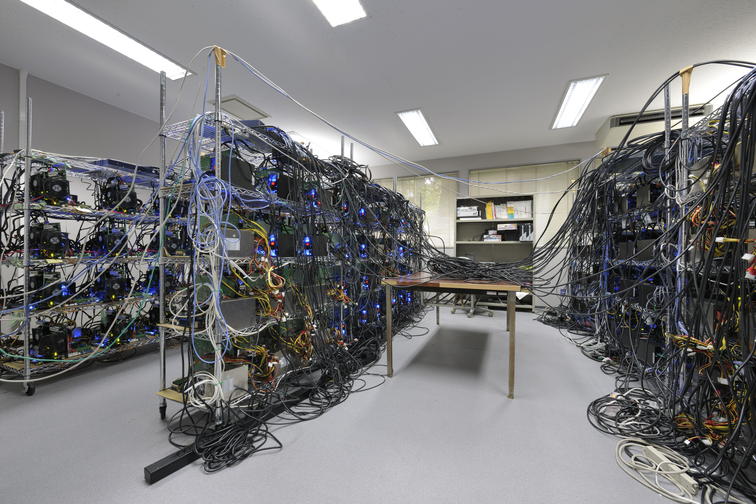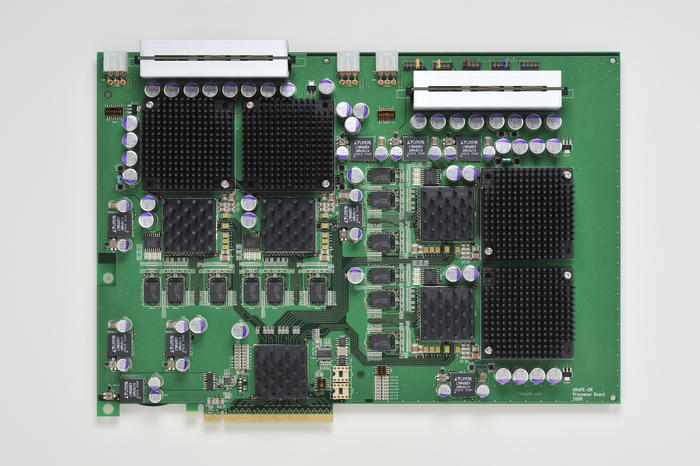World's Greenest Supercomputer Not the Fastest
I'm pretty sure that it can.
Supercomputers are tasked with performing massive calculations that can't be practically done in any sort of reasonable time on regular computers. For that, supercomputers have special power and cooling needs, but as we can see from the Department of Information Science at the University of Tokyo, supercomputers can be green-minded too.
The Japanese supercomputer system, called Grape-DR, is ranked as the greenest supercomputer on the planet. Its performance over power is 815.43 MFLOPS per watt, besting the second place IBM's 773.38 MFLOPS per watt in Germany.
The Grape-DR is composed of 64 Core i7-920 microprocessors, and Asus motherboard, 18 GB of DDR3 memory, and a custom accelerator board.
The custom accelerator board, developed by a professor at the University of Tokyo, enhances performance of the Core i7-920 system by about five times, according to TechOn.
While the Grape-DR is the most energy efficient supercomputer in the world, it's not even near the fastest. Its total performance of 23.4 TFLOPS is below the 24.67 TFLOPS needed to crack the top 500 supercomputers in the world.
Get Tom's Hardware's best news and in-depth reviews, straight to your inbox.
-
Parsian "I'm pretty sure that it can."Reply
but you dont have access to it, so it is all assumption sigh -
rohitbaran It may not be the fastest, but looking at the specs, at least it could very well play crysis! :PReply -
Parsian "Its total performance of 23.4 TFLOPS is below the 24.67 TFLOPS needed to crack the top 500 supercomputers in the world."Reply
thoses numbers seem to be too low, you can beat that with bunch of graphic cards like TESLA packages -
Shin-san I'm not surprised the PowerXCell 8i made it into the Green 500 list. The Cell processor's advantage for the PS3 wasn't high power, but the most power they could pack into 75 Watts, which made desktop CPUs at that time not very usable in a console. However, it seems like the faster Cell machines need another CPU to complement it like the AMD Opteron.Reply
-
grieve Parsian"Its total performance of 23.4 TFLOPS is below the 24.67 TFLOPS needed to crack the top 500 supercomputers in the world."thoses numbers seem to be too low, you can beat that with bunch of graphic cards like TESLA packagesyah, this is my old rig... i needed to upgrade.Reply -
Shin-san Parsian"Its total performance of 23.4 TFLOPS is below the 24.67 TFLOPS needed to crack the top 500 supercomputers in the world."thoses numbers seem to be too low, you can beat that with bunch of graphic cards like TESLA packagesThis isn't the fastest computer, but the most efficient supercomputer. The Tesla rigs are definitely fast and right now a Tesla supercomputer is #2, about the Cell supercomputer. That computer IS listed in the Green 500Reply -
MU_Engineer I wonder how reliable it will be with those consumer parts in it and a complete lack of any reliability features like ECC memory. I would imagine there is node-level failover to recover from an individual board going belly-up, but if I built it, I'd feel a lot better if it used a proper 1P workstation/server board and a Xeon 35xx/36xx CPU to be able to use ECC memory.Reply -
vectorm12 I'd be interested in finding out exactly could be done with one of those accelerator boards in a workstation running Windows or Linux. Wonder what it does exactly?Reply -
blasterth top500 ranks using the "LINPACK Benchmark", not the Nvidia theoretical specifications.Reply


